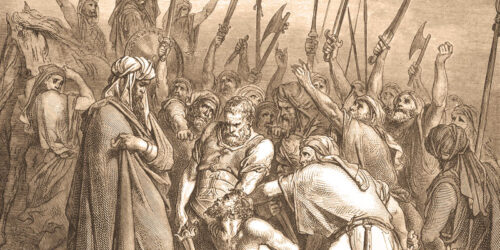Honor your father and your mother so that your days may be long upon the soil which God, your God, is giving you.
20:12
While I say that there are sins for which punishment in this world is inevitable…I must furthermore make it clear that there are, on the other hand, certain good deeds which are perforce requited in this world, even though he that performs them is an unbeliever. These, I say, are three in number. The first of them is a loving demeanor toward parents…A second is pity on animals…The third, again, is dealing honestly…
Saadya Gaon: (9th Century)
The exodus from Egypt and the giving of the Law: these two basic facts in the history of the Jewish people that form the foundation for our allegiance to God as the Ruler of our destinies and Guide for our lives are historic truths. However, our knowledge and acknowledgement of historic truths depend on our having a tradition. The maintenance of the tradition in turn requires parents who will faithfully transmit it to their children, and children who are willing to accept it from the hands of their parents…Without this tie…the past of the Jewish people is lost to the future and the Jewish nation will cease to exist.
Samson Raphael Hirsch (19th Century)
The essence of “honor” is only when the parent enjoys some benefit from the act of the child…But if a parent tells a child to do something which does not bring some benefit to the parent, that is not included in “honor” as commanded by the Torah, and the child is not required to defer any kind of Torah prohibition in order to obey the parent.
Rashba(17th Century)
In (this) commandment, the focus is on the flow of the generations. Will the generation that bears the weight of the family’s existence now…preserve its identity by acknowledging its origins through due honor to its parental generation?..We will not go wrong if we deduce from the position of the parents-commandment as the first of the commands with reference to fellow humans a certain preeminence of the concern for the continuity of the extended family…
Waldemar Janzen (Contemporary)
Some Jewish thinkers, even though they acknowledge the validity of an autonomous ethics, nonetheless maintain that one should comply with an ethical norm out of a desire to submit to the Divine Will rather than to satisfy an ethical requirement…i.e. despite the fact that human reason can apprehend and validate filial obligations as moral duties, a religious believer should fulfill them not because of their intrinsic ethical merits discernible by human reason or sentiment, but out of obedience to a divine imperative…This explains why Judaism has no need for the Kierkegaardian doctrine of “the suspension of the ethical,” which demands that whenever moral imperatives clash with religious commandments, we must subordinate our ethical concerns to the higher authority of the religious. Once God is defined as the supreme moral authority, obedience to divine imperatives emerges as the highest ethical duty…
Walter Wurzburger (20th Century)
Alienation and identity play a central role in the Exodus narrative. Both on the individual and national levels, the experience of being a stranger and searching out one’s past figure prominently in the process of psychological development. Moshe, the estranged son of his people, who grew up in the house of the enemy and oppressor, did not share in the immediate history of his people. In his privileged status as a prince in Pharaoh’s house, a safe distance from the mud pits of his enslaved brethren, he remained physically and culturally disconnected from their experience. Yet he too knew on a personal level the meaning of being a stranger in a foreign land, and the struggle to separate from the surrounding culture in an attempt to establish an independent identity. The correspondence between his personal odyssey and that of the Israelites provided him with intimate knowledge of their experience, making him uniquely suited to serve as their leader.
Carolyn Peyser (Contemporary)







